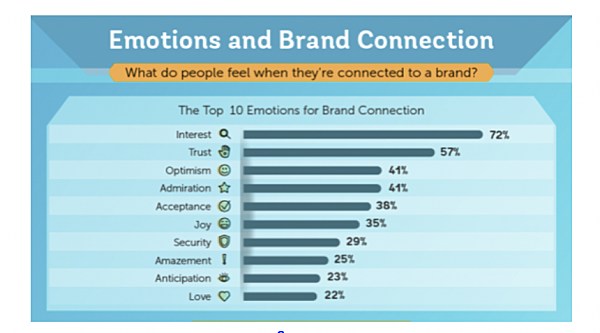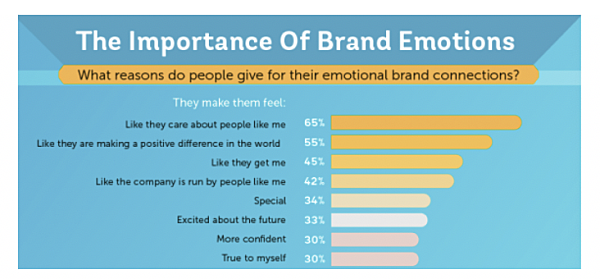What are some crucial elements of a successful, strong marketing strategy?
While aspects like creating relevant content or having a deep understanding of your audience are undoubtedly necessary, there is 1 main element that must be part of your strategy if it's going to be effective: empathy.
By definition, empathy is the ability to understand and share the feelings of another person. So, without empathy, your brand will never be able to create effective content unless you're able to understand what your audience is looking for or desires.
Empathy-based marketing is important in today’s world because the connection between brands and customers is more critical than ever. Studies have found that when consumers feel a connection to a business, they're far more likely to not just buy, but to spend more with each purchase and even become an advocate for the brand itself.
So, what does empathy-based marketing have to do with building connections? And how can you use it to create a strong brand identity that drives in sales?
Let’s dive in.
People want to follow a narrative, not a product
Think about 2 of the world’s more beloved brands: Coca-Cola and Nike. Why do people love these companies so much? Yes, they might have some great products—but competitors like Pepsi and Adidas make similar (and in some cases, better) ones.
The reason why consumers love and support these businesses is because they have bought into the brand’s storytelling. Coca-Cola focuses on classic Americana and nostalgia. When you think of its marketing, you can probably imagine its classic polar bear ads that run during the holiday season.
Nike conjures up imagery of athleticism and leadership, and their brand story is based on inspiration. They have created a brand story of pushing the limits, trying harder, and succeeding, most clearly through their memorable tagline “Just Do It.”
This shows you that oftentimes customers are buying into the emotions that are created by the company—instead of the product itself. So, how can a company create feelings of empathy?
One way is by showcasing that your company cares about its customers. According to Customer Thermometer, this was the top reason why customers felt emotionally connected to a company, along with the sense of feeling understood or special.
Airbnb has done a spectacular job of this by creating heartwarming content that shows just how much the company truly cares about both hosts and guests. In 2017, it took a strong stance against discrimination by focusing on encouraging hospitality, tolerance, and creating cross-cultural connections.
Its content shows customers that the company truly cares about their experience and wants to create a safe and inviting place for them. This in turn creates trust, which leads to loyalty.
The digital age has changed things
Social media is a double-edged sword. In some ways, it has brought the world together in a way that was never before possible. But in terms of business, it has made it even harder to connect because there are now thousands of companies who are trying to do the same thing.
Although social media seems to have a more negative affect on its users (such as a link to narcissism, anxiety and depression), it seems that users are looking to brands to create positive content on these channels. According to a study published by Sprout Social, 72% expect brands to be “positive contributors to society” and 48% wanted to see them set moral standards.
Clearly now, more than ever, empathy requires a conscious effort when building an online store and learning how to market it. Cultivating meaningful connections, sharing positive content, and building social awareness should be a top priority in your marketing strategy.
An effective way to do this is to share true, meaningful stories from customers that bring people together through empathy and shared experiences. Dove has done a great job of this with its “Campaign for Real Beauty” which focuses on inclusion and self-acceptance.
Its YouTube channel features stories from inspiring women who have faced challenges accepting their own beauty.
This is extremely inspirational and creates positive emotional connections with consumers by showing that Dove truly cares about its users and supports a positive social cause.
Emotion as a brand goal
Tapping into emotions is an extremely powerful marketing strategy—and we see companies doing this all of the time in various ways. And, unfortunately, many businesses choose to focus on negative emotions to drive in sales.
For instance, insurance companies create a sense of fear by showing you that your house could easily burn down and you’ll be left with nothing unless you have good insurance. Another example is how luxury car brands make consumers feel like they need to buy the latest model to keep up with the Joneses, perpetuating greedy consumerism.
However, cultivating positive emotions is often the better way to go, especially when you're trying to establish your company’s reputation.
Referring back to the study from Customer Thermometer, you can see that customers prefer to buy from companies that promote positive feelings, like inclusion and confidence. Consumers also stated the top emotions that created connections were interest, trust, and optimism. Source
Source
In order to effectively use empathy as part of your marketing strategy, you should first define your morals and goals as a business, both publicly and internally.
- What is the message you want to portray to your audience?
- What does your company truly care about?
One way to do this is to show how your company supports social causes, such as protecting the environment, treating employees well, or supporting charities.
Toms is one of the best examples here, as the bulk of its marketing focuses on the charity work the company does, rather than the products it sells.
Customers want to support this company because they know their money is going to a good cause, which in turn, makes them feel better about spending money with the brand.
Conclusion
Feelings are an important ingredient to the recipe for marketing success—and in today’s digital world, consumers are looking to brands that understand what they want.
Using empathy-based marketing is a powerful way to connect with people on a deeper level than just selling your product. It shows that your business truly cares about customers, and this is 1 of the best ways to build loyal brand communities.






